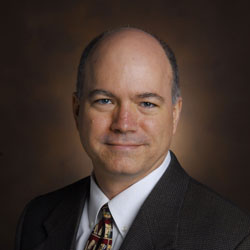Thomas A. Lasko, MD, PhD
I am an Associate Professor of Biomedical Informatics in the School of Medicine at Vanderbilt University, and an Associate Professor of Computer Science in the School of Engineering. I earned an MD from the UCSD School of Medicine, an SM in Medical Informatics from the Harvard-MIT Division of Health Sciences and Technology, and a PhD in Computer Science from MIT's Computer Science and Artificial Intelligence Laboratory, advised by Pete Szolovits and Staal Vinterbo. I completed my clinical internship at the wonderful Gundersen Health System (where I learned all of the ways that working on a farm can be harmful or fatal. Such as falling into a manure pit and asphyxiating on the hydrogen sulfide. Or jumping in to rescue that person and suffering the same fate. The third - or sometimes fourth - guy usually decides not to jump in.) and a postdoctoral fellowship at Harvard Medical School, with Octo Barnett in The Laboratory of Computer Science at Massachusetts General Hospital and Lucila Ohno-Machado in The Decision Systems Group at Brigham and Women's Hospital. Before switching to computational medicine, my first career was as an optical engineer; I designed and built prototype fiberoptic sensors for aircraft at Science Applications International Corporation and developed the optics for a high-speed optical genetic sequencer at a (now defunct!) startup. My bachelor's degree is in Physics.
Following grad school, where my computer science degree focused on medical machine learning, I was a software engineer at Google, where I worked on unsupervised methods to learn clinically relevant patterns from the thousands of medical books in Google Books and from the mind-bogglingly-massive Google query stream. I also developed the algorithm and prototype for Google Symptom Search, a purely data-driven computational diagnosis engine that uses the entire Web as its input dataset.
My current research interests are in the computational aspects of precision medicine. In particular, I am working on the phenotype discovery problem, which is the effort to infer the clinical phenotypic signatures of every existing disease, using large amounts of Electronic Medical Record data and modern machine-learning methods. We consider current clinical disease labels to be useful abstractions over a set of many different pathophysiologic processes, but the abstractions can also degrade diagnostic and treatment precision. Our hypothesis is that similar but distinct pathophysiologic processes produce similar but distinct imprints on the clinical record. If we can computationally disentangle those imprints, we can illuminate the distinct mechanistic processes active in a given patient, which may help us identify the precise optimal treatment for that patient.
I am/have been funded by generous grants from the Edward Mallinckrodt, Jr. Foundation, and the NIH.
Current primary trainees
Kim (Kondratieff) Cox (PhD Student)
Marco Barbero Mota (PhD Student)
Currently advising, but not as primary mentor. (In my department except where noted.)
Thomas Li (EECS)
Kaiwen Xu (EECS)
Students/Postdocs previously advised, now finished (and where they went next)
Robert Carroll, PhD 2015. (Research Assistant Professor, Vanderbilt Biomedical Informatics)
Yukun Chen, PhD 2016. (NLP Scientist, Parkland Center for Clinical Innovation)
Ravi Atreya, (MSTP) PhD, 2016. (Co-founder and CTO, PredictionHealth)
Dan Putnam, PhD 2016. (Research Scientist, St. Jude's Children's Research Hospital)
Pedro Teixeira, (MSTP) PhD, 2016. (Co-founder and CEO, PredictionHealth)
Jacob VanHouten, (MSTP) PhD, 2016. (Resident, Yale Griffin Internal Medicine/Preventive Medicine)
Morgan Harrell, PhD 2017. (Clinical Data Scientist, Roam Analytics)
Julian Genkins, MD 2018. (Internal Medicine Resident, UCSF))
Sharidan Parr, (MD), MS 2018. (Assistant Professor, Vanderbilt Biomedical Informatics)
Mara Kim, PhD 2018. (Machine Learning Engineer, S&P Global Market Intelligence)
Lina Sulieman, PhD 2018. (Postdoc, Vanderbilt Biomedical Informatics)
Shikha Chaganti, PhD 2018. (Siemens Healthineers)
Ling Chen, PhD 2019. (Senior Data Scientist, Illumina, Inc.)
Sharon Davis, PhD 2019. (Assistant Professor, Vanderbilt Biomedical Informatics)
Diego Mesa, Postdoc 2019. (Assistant Professor, Vanderbilt EECS)
Linda Zhang, PhD 2021. (Data Scientist, XSOLIS)
Matt Lenert, PhD 2021. (Lead Data Architect, Careignition)
Colin Hansen, PhD 2021. (AI Scientist, Covera Health)
Riqiang Gao, PhD 2021. (Siemens Healthineers)
Yucheng Tang, PhD 2022. (Siemens Healthineers)
Katie Williamson, (MD), MS 2022. (Pediatric Infectious Disease Specialist, Cook Children's Hospital)
Cailey Kerley, PhD 2022. (Data Scientist, Trilliant Health)
Siru Liu, Postdoc 2023. (Assistant Professor, Vanderbilt Biomedical Informatics)
Ioana Danciu, PhD 2024. (Research Scientist, Oak Ridge National Laboratory)
Bryan Glazer, PhD 2024. (Postdoc, St. Jude's Children's Research Hospital)
Code repository for my Computational Medicine Lab.
Publications at my Google Scholar page
Patents
US Patent 5,323,229. May BA, Lasko TA, Everett DH. Science Applications International Corporation, assignee. Measurement system using optical coherence shifting interferometry, 1992.
US Patent 8,473,489. Lasko TA, Tomkins A, Angelo M, Gray MK, Ryan R, Godbole NU, Zeiger RF. Google, Inc, assignee. Identifying Entities Using Search Results, 2013. (This and the next three are Google Symptom Search Patents).
US Patent 8,775,439. Lasko TA, Tomkins A, Angelo M, Gray MK, Ryan R, Godbole NU, Zeiger RF. Google, Inc, assignee. Identifying Entities Using Search Results, 2014.
US Patent 8,843,466. Zeiger RF, Lasko TA, Tomkins A, Angelo M, Gray MK, Ryan R, Godbole NU. Google, Inc, assignee. Identifying Entities Using Search Results, 2014.
US Patent 8,856,099. Lasko TA, Tomkins A, Angelo M, Gray MK, Ryan R, Godbole NU, Zeiger RF. Google, Inc, assignee. Identifying Entities Using Search Results, 2014.
